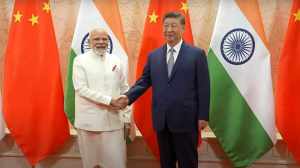quot;Indo-Pak hostility renders SAARC impotentquot;
COLOMBO, July 25: Smaller member countries of the SAARC have resigned themselves to watching another round of wrangling between their two...

COLOMBO, July 25: Smaller member countries of the SAARC have resigned themselves to watching another round of wrangling between their two big brothers 8212; India and Pakistan at the 10th SAARC summit here next week.
While Pakistan is going all out to get a discussion on Kashmir included in the agenda, India is attempting to bring the focus back on trade. 8220;We are tired of the India-Pakistan squabble. There is no SAARC spirit now. If we want anything done within SAARC, we have to wait for these two to resolve their differences,8221; said a diplomat of a tiny member country.
Pakistan says these differences should be resolved internationally and that SAARC is a forum that can serve this purpose. In order to project the Kashmir dispute as a matter of regional concern, Pakistan has been keenly stressing a link between Kashmir and the nuclear tests in the sub-continent.
India8217;s stand is that the Kashmir dispute is a purely bilateral matter, that the nuclear tests do not threaten regional security in any way, andthat SAARC must concentrate on economic and social issues confronting South Asia.
The other five members, dependent on both India and Pakistan in one way or another, would rather say nothing, lest it offend one or the other. In a display of the fine line, between their two big neighbours, that these smaller countries constantly walk, Sri Lankan foreign minister Lakshman Kadirgamar on Thursday hastily dismissed any categorical assumptions that the July 29 SAARC summit would avoid the issue of the nuclear tests in India and Pakistan.
8220;I did not say SAARC will avoid it, or take it up. There is no agenda. Whether the SAARC summit will take up the matter is entirely up to the leaders,8221; he said at a press conference. The chairmanship of the regional grouping passes to Sri Lanka from the Maldives this year.
The overriding feeling amongst these smaller countries is that unless Pakistan and India resolve their differences, SAARC8217;s primary economic goal of a free trade area and even co-operation on socialissues like health and education will remain a distant dream.
8220;The fate of 1.1 billion people is being held to ransom by the shenanigans of these two countries,8221; said a diplomat, who is in the Sri Lankan capital for the preparatory meetings ahead of the summit.
Last year8217;s predication by the then Indian foreign secretary, Salman Haidar, of South Asian integration, economic union, and a single currency was nothing more than a 8220;pipe dream8221;, the diplomat asserted.
Though the stated theme of the 10th summit is economic co-operation, analysts here believe that the core issues before this summit 8212; the first to focus on the economy 8212; will be overshadowed by the tug of war between India and Pakistan.
It was perhaps the apprehension that the interests of the smaller members would be sacrificed if the two big members were mutually hostile, that led Sri Lankan president Chandrika Kumaratunga to suggest at Male last year that the grouping should consider a mechanism for 8220;informal discussions8221; on bilateralor contentious issues. The SAARC charter bans the bringing up of such issues on the summit agenda.
However, no such informal mechanism has been put in place yet. Kadirgamar on Thursday emphasised that an amendment of the SAARC charter to include an institutionalised mechanism for informal talks between leaders on contentious issues was 8220;simply not on8221;.
Despite the official diffidence, there has been a growing demand articulated in the columns of newspapers in the host country this year that SAARC must not evade certain issues by terming them bilateral and that the grouping can prosper only if member countries squarely confront these issues.
8220;The blatant display of nuclear capability by India and Pakistan, the two biggest SAARC members, transcends the bilateral concept. Economic sanctions, imposed on the two rivals by the US and Japan, will in the long run adversely affect Sri Lanka and other member countries. That alone should be enough cause for concern among them,8221; said an editorial in TheWeekend Express.
- 01
- 02
- 03
- 04
- 05































